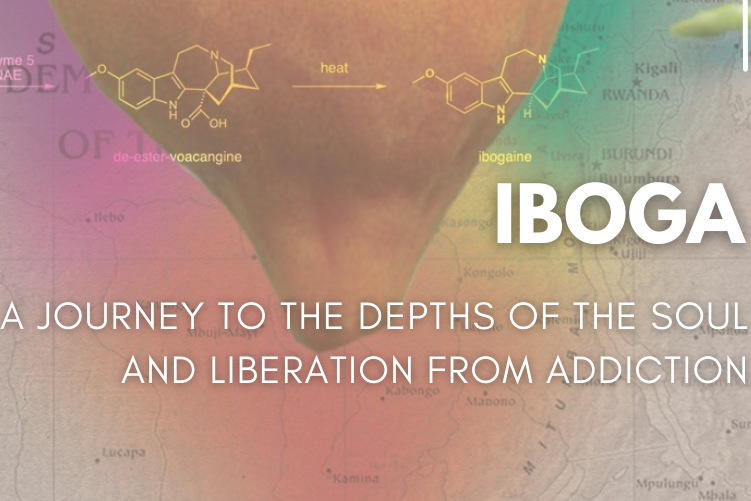
What is an Ibogaine Experience Like?
If you’ve spent some time learning about, or experimenting with, psychedelics, you might by now have heard of ibogaine. Ibogaine is a powerful and potentially life-changing psychoactive that is garnering attention for its powerful anti-addiction properties. However, the experience of taking ibogaine is unlike that of any other psychedelic. Curious what an ibogaine experience is like? We’re going to take you through it in detail, shedding light on its origins, effects, and more.
Table of Contents
What is Ibogaine?
Ibogaine is a psychoactive substance related chemically to other ‘tryptamines’. It is the psychoactive compound found naturally in the iboga plant, a root native to West Africa. Ibogaine works by interacting with opioid, glutamate, and serotonin receptors in the brain. Its complex pharmacology is responsible for its effects on perception, cognition, and emotional processing.
Where Does it Come From?
Ibogaine has been used in traditional West African spiritual practices and indigenous cultures for centuries. It’s most commonly associated with the Bwiti religion of West Africa, where it is used as a sacrament in healing ceremonies, spiritual journeys, and initiation rituals. The Bwiti believe that ibogaine can facilitate contact with the spiritual realm, connect a person with their ancestors, and bring about profound insights into the mysteries of existence. The iboga root is now being researched for its potential application in addiction treatment and psychotherapy.
What is an Ibogaine Experience? Here’s What to Expect
An ibogaine journey is said to be like a voyage through the subconscious. The consumer is said to gain insight into their life experiences, emotions, and the underlying patterns that characterize their psychology and behavior. The journey is intense and usually characterized by vivid imagery, introspection, and emotional release. Although on the surface this sounds similar to other psychedelics, many ibogaine users who have tried a range of psychedelic substances insist that this one feels different.

Duration of an Ibogaine Experience
There are several factors affecting the duration of the ibogaine experience, including the metabolism of the person taking it, the dosage administered, and the specific formulation of Ibogaine used. The first phase of the experience (known as ‘the acute phase’) typically lasts from 4 to 8 hours. During this phase you should expect intense visual hallucinations. You will be deeply introspective and considerate of the nature of reality itself. You will be able to release your emotional pain and may experience epiphanies about your life and your thought and behavior patterns. And you might not be able to sleep for the first couple of nights after you’ve ingested it.
The residual effects of Ibogaine frequently last for a more extended period. Some people experience an afterglow or a “reset” sensation that persists for weeks after the initial experience. During this phase, your energy and/or libido may be heightened. This afterglow period is often described as a time of reflection and continued processing and integration of the insights gained during the Ibogaine journey.
Physical Effects of an Ibogaine Experience
Ibogaine’s physical effects set in soon after consumption. They may include tremors, changes in your heart rate, and fluctuations in blood pressure. You may feel nauseous and have to vomit. You may experience a feeling of physical heaviness and lack of coordination. These effects are temporary and should subside within a few hours. However, it is important to take ibogaine in a medically supervised setting with proper monitoring and safety protocols.
Once your body adjusts to the effects of Ibogaine, you might feel a deep sense of relaxation and calmness, a pleasant heaviness, or a feeling of groundedness in your body. You may also notice a heightened sensitivity to your surroundings. Tactile sensations could feel different, or you might have a stronger awareness of your physical presence.
Changes in perception and sensory experiences are also common. Colors could appear more vibrant, and sounds more profound. Some users also report enhanced visual imagery, where closed-eye visuals become more vivid and dreamlike. These visual experiences can include geometric patterns and shapes or intricate scenes and landscapes.
As with any substance, physical experiences vary from person to person. You might have a sense of increased energy and physical stimulation, or you might feel more relaxed and sedated–it’s hard to predict in advance what kind of experience you’ll have. Each individual’s unique physiology and response to Ibogaine contributes to their physical experiences during and after the journey.
Emotional and Psychological Effects of an Ibogaine Experience
Ibogaine has a profound impact on emotions and psychological processes. It could bring your repressed memories to the surface, allowing you to confront unresolved trauma and gain insights into your behavior and blind spots. The experience is often described as emotionally cathartic, often leading to a sense of liberation, self-acceptance, and personal growth. Many users also report a feeling of increased connection to themselves and others.
That said, an ibogaine trip is not easy. Expect it to involve profound discomfort. After all, facing traumas and uncomfortable memories isn’t exactly a cakewalk. If you’re thinking about trying ibogaine, bear in mind that although it could yield life-changing benefits, the experience itself will entail its fair share of difficult moments.

Therapeutic Effects of an Ibogaine Experience
Ibogaine has shown great promise as a treatment for addiction and substance abuse disorders. This is because ibogaine appears to reduce withdrawal symptoms and lessen drug dependency.
At the same time, the intense and introspective nature of the experience can provide individuals with meaningful epiphanies about the root causes of their addictive behaviors. These effects act in tandem with ibogaine’s introspective benefits, giving substance abuse patients a leg up against their addictions and a real chance to break the cycle of addiction and recover for good.
While further research is needed to fully understand ibogaine’s therapeutic effects, anecdotal reports and preliminary studies suggest that it has potential as a valuable adjunct to addiction treatment and psychotherapy.
And whether you’re suffering from addictive behavior or not, the emotional release and sense of self-reflection experienced during an Ibogaine trip contribute to personal growth, enhanced self-awareness, and improved overall well-being.
Preparing for the Experience
Embarking on an Ibogaine journey requires careful preparation to ensure safety and maximize the potential benefits. If you decide to try ibogaine, you will likely be asked to undergo rigorous medical screening beforehand. If not, rethink the treatment or healing center you’re working with, as this step is necessary to make sure that ibogaine is not contraindicated for you or that you receive the medical support you need prior to and during your experience. You will also be asked to abstain from certain substances, such as opioids, stimulants, depressants, alcohol, and some medications. While this may be intensely difficult for addicts, it’s necessary to enter the experience without these substances in your system in order to take ibogaine safely. Readying the mind and setting intentions are also essential aspects of the preparation process.
Aftercare and Integration
We cannot stress this enough: Integrating the ibogaine experience is crucial for long-term benefits and for banishing addictions. Integration involves incorporating the insights gained from the journey into daily life and making positive changes. Supportive aftercare practices might include therapy, coaching, counseling, or participation in support groups. These can provide a valuable framework for integration and ongoing growth.
Because integration is so important, if you decide to try ibogaine it’s absolutely imperative that you choose a retreat or treatment center that includes a high level of support after leaving the program. The ibogaine trip itself is only 50% of the work.
The Ibogaine experience is a deeply personal and transformative journey that offers illuminating revelations and potential therapeutic benefits, especially as a last-resort treatment for addiction. However, it is not for everyone, nor is it without risks. Approach ibogaine with caution and under the guidance of experienced professionals, and understand the effects, risks, and preparations involved in order to make an informed decision about whether an Ibogaine experience is right for you.
For more information about Ibogaine and the Treatment Centers that offer it, please consult our Ultimate Guide to Ibogaine Treatment Centers!

Comments